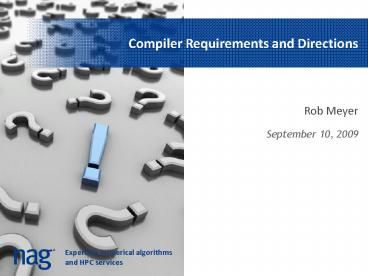Compiler Requirements and Directions - PowerPoint PPT Presentation
Title:
Compiler Requirements and Directions
Description:
... ppt/Masters/Master1.xml ppt/notesSlides/notesSlide7.xml ppt ... xml ppt/diagrams/layout1.xml ppt/diagrams/quickStyle1.xml ppt/tableStyles.xml ... – PowerPoint PPT presentation
Number of Views:17
Avg rating:3.0/5.0
Title: Compiler Requirements and Directions
1
Compiler Requirements and Directions
- Rob Meyer
- September 10, 2009
2
NAG in 30 Seconds
3
Q1. Language support for HPC
- Provocative short answer We arent
- Longer, politically correct answer but were
working on it - Standard-compliant Fortran compiler using latest
standards (2003) - OpenMP Library for nodes
- MPI-based Library for loosely coupled systems
- No magic wands (really)
- Managing communications is the key to scalability
- PGAS languages and other vendor libraries/tools
will help but - application design (for communications) and
data distribution will have a profound impact on
scalability - MPI, hard as it is, survives for a reason
- If this was easy wed be playing golf (or hanging
out in the pub)
But co-arrays will be part of Fortran 2008
4
Q2. Performance Optimization
- Provocative short answer We arent (again)
- Longer, politically correct answer Were
(still) working on it - Inter-process communication is still the critical
issue - Hardware providers keep communication costs low
- Programmers reduce communications
- Dynamic optimization?
- Potentially helpful along with a range of other
techniques - Hardware-resource-aware middleware?
- Ultimately, massively parallel performance will
still depend more on the programmer than the
compiler
5
Q3. Support for Heterogeneous cores?
- A series of partial answers
- OpenMP support for conventional cores
- Linking to GPUs for appropriate code
- Have built/tested equivalent routines for GPUs
- Rhetorical question what if we are successful?
- Portability of code?
- Complexity of code?
- Correctness of results?
6
Q4. Tools for serial code/parallel novices?
- Not likely (that well do it)
- Not likely to be successful in a broad, sustained
fashion - Would we be better off using a community of
experts to parallelize code and training the
owners rather than trying to develop HPC for
Dummies tools?
7
Q5 Support of pre-compiled libraries?
- Our own
- Expanding the number of routines optimized for
multi/many core - Link to Intel, AMD, etc vendor libraries from our
code where they have optimized for multi-core - Identifying options for updating/re-inventing
MPI-based library
8
Some last thoughts
- The landscape is getting more (not less) complex
- Threading tools
- Languages
- Processor options
- Another view If our objective is to produce more
useful results in a given amount of time given - Hardware languages
- User software
- User expertise
- Vendor/community software tools
- Vendor/community people expertise?
- Are we putting too much emphasis on compilers and
tools? - Should we put more emphasis on training
supporting users































